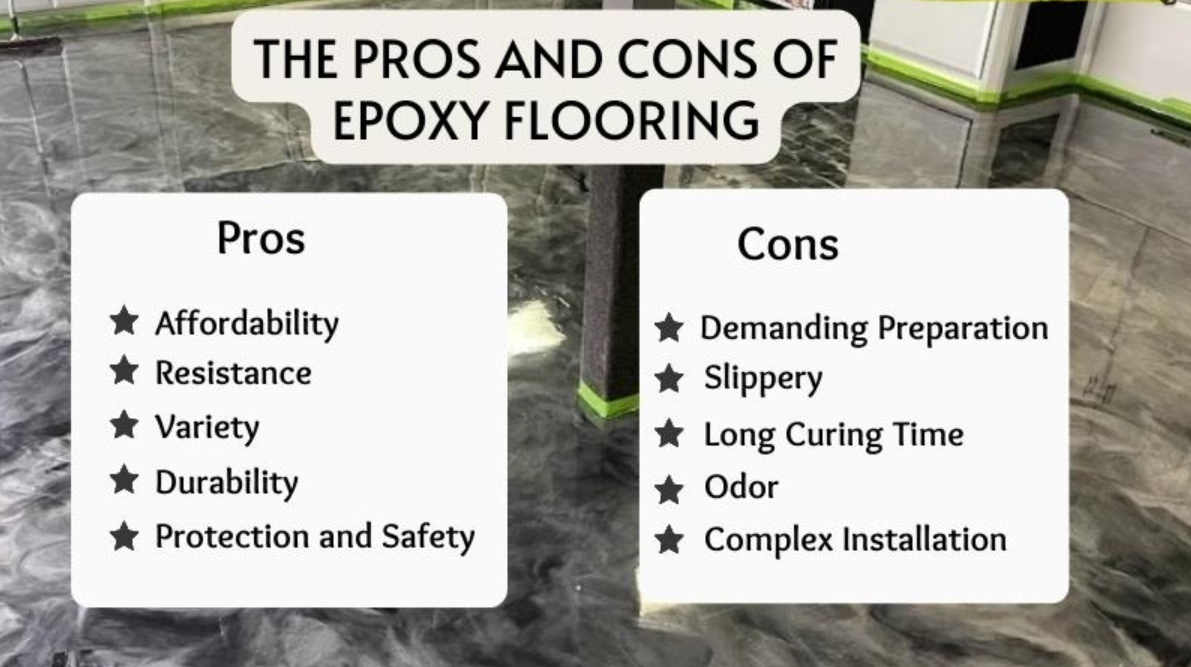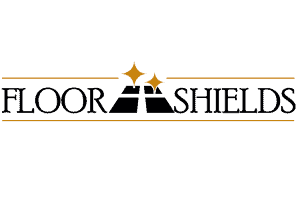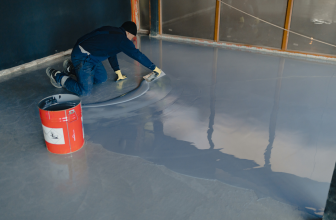
Pros and Cons of Epoxy Flooring! Epoxy flooring is a popular choice for many homeowners and businesses due to its durability, versatility, and aesthetic appeal. This type of flooring is created by combining resin and hardeners to create a strong, seamless surface that can withstand heavy foot traffic, spills, and other wear and tear. However, like any flooring option, epoxy has its own set of pros and cons that should be considered before making a decision. In this article, we will explore the benefits and drawbacks of epoxy flooring. We will delve into the various types of epoxy available on the market today, as well as their different uses and applications.
Table of Contents
The Pros and Cons of Epoxy Flooring
Here are five advantages and disadvantages of epoxy flooring to help you make an informed decision.
Pros of Epoxy Flooring
Durability
Epoxy flooring offers exceptional durability, which is one of its biggest advantages. It is highly resistant to impacts, stains, chemicals, and abrasions. This makes it a suitable choice for high-traffic areas, such as garages, warehouses, and industrial facilities. Epoxy floors can withstand heavy foot traffic, machinery, and even vehicular movement without showing signs of wear and tear.
Versatility
Epoxy flooring offers a wide range of design options, allowing you to customize the look of your space. It is available in various colors, finishes, and patterns, giving you the flexibility to create a unique and personalized floor. Whether you prefer a solid color, a metallic effect, or a decorative flake design, epoxy can be tailored to match your aesthetic preferences.
Easy Maintenance
Epoxy floors are relatively easy to maintain. The smooth and seamless surface of epoxy prevents dirt, dust, and liquids from penetrating the floor, making it easy to clean. Regular sweeping and occasional mopping with a mild detergent is usually sufficient to keep the floor looking clean and attractive. Epoxy flooring is also resistant to stains, so spills can be quickly wiped away without leaving permanent marks.
Chemical Resistance
Epoxy is highly resistant to chemicals, including oils, solvents, and cleaning agents. This makes it an excellent choice for industrial and commercial spaces where chemical spills are common. The chemical resistance of epoxy ensures that the floor remains intact and protects the underlying concrete or substrate from damage.
Cost-Effective
In the long run, epoxy flooring can be cost-effective. Its durability and low maintenance requirements mean that you won’t have to invest heavily in repairs or replacements. Additionally, the seamless surface of epoxy reduces the accumulation of dust and allergens, making it a healthier choice for allergy sufferers.
Cons of Epoxy Flooring
Initial Installation Complexity
The installation process of epoxy flooring can be complex and time-consuming. The surface must be prepared properly, including cleaning, repairing cracks, and ensuring smoothness. Additionally, the application of epoxy involves mixing precise ratios of resin and hardener, as well as using specialized tools and techniques. For optimal results, it is recommended to hire professional installers with experience in epoxy flooring.
Slipperiness
Epoxy flooring can be slippery, especially when wet. This can pose a safety hazard, particularly in areas prone to spills or moisture, such as kitchens, bathrooms, or entryways. However, this issue can be mitigated by adding anti-slip additives or using a textured finish, which provides better traction.
Vulnerability to UV Exposure
Prolonged exposure to direct sunlight can cause epoxy flooring to yellow or fade over time. This makes it less suitable for outdoor applications or areas with significant sunlight exposure. To address this issue, UV-resistant epoxy coatings are available, which are specifically designed to withstand UV rays and maintain their color and integrity.
Limited Repair Options
If epoxy flooring gets damaged or develops cracks, repairing it can be challenging. Unlike other flooring options, epoxy cannot be patched or repaired seamlessly. In most cases, the damaged section needs to be completely removed and replaced, which can be time-consuming and costly.
Conclusion
In conclusion, there are both pros and cons to consider when it comes to choosing epoxy flooring for your home or business. On the positive side, epoxy floors are durable, easy to maintain, and come in a variety of colors and styles. Additionally, they can be used in a range of settings from garages to commercial kitchens. However, some downsides include the potential for a slippery surface and the cost of installation. Ultimately, it’s important to carefully weigh the advantages and disadvantages before making a final decision. With proper research and consideration, you can determine if epoxy flooring is right for your needs.
Also Read: Is Epoxy Good for Garage Floor








